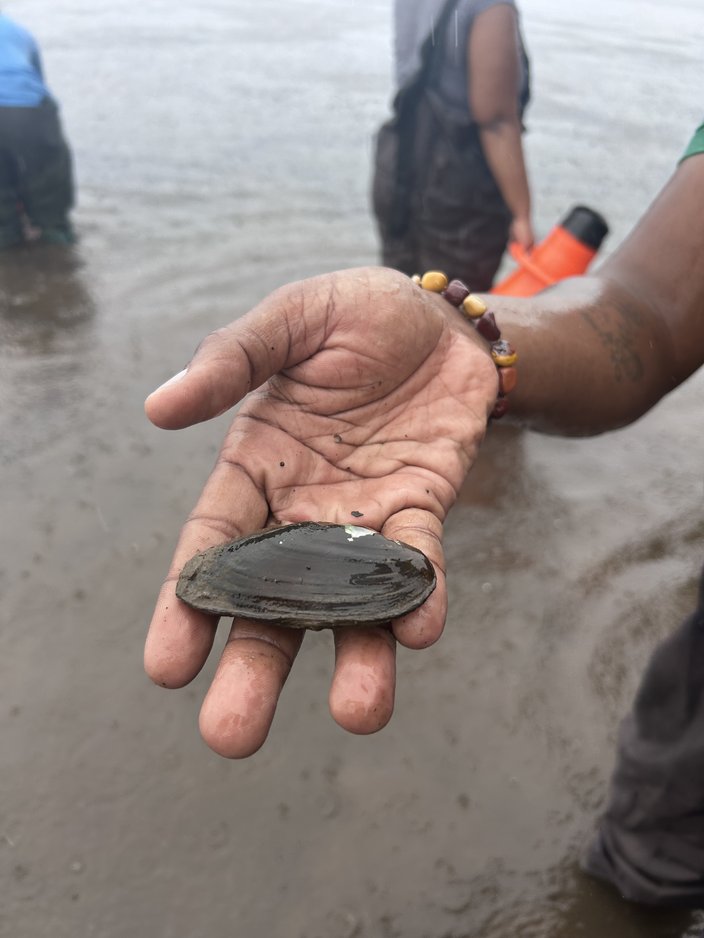Exploring the wonders of nature can often lead to exciting discoveries, and that’s exactly what environmental scientists and teenage campers experienced during a recent survey near the Pennypack Creek in Northeast Philly. As they scoured the riverbed at low tide, their eyes fell upon a heartening sight – approximately 120 freshwater mussels, a species that has become increasingly rare in the region’s waterways.
These bivalve mollusks, akin to oysters and clams, play a vital role in maintaining water quality by feeding on bacteria, algae, and pollutants in the water. As integral members of the ecosystem, freshwater mussels support a diverse food web, offering critical habitats for fish and other aquatic species.
MORE: A section of Camac Street in Center City is being repaved with wood blocks for historic preservation
The survey was part of a broader initiative aimed at monitoring and restoring freshwater mussel populations in the Delaware River watershed. Despite more than a dozen native species being known to inhabit the Delaware Estuary, factors like pollution, toxic spills, and deforestation have significantly dwindled their numbers over the years.
“Finding these filter feeders near Pennypack Creek in the Delaware River was a delightful treat,” expressed Bria Wimberly, a public program coordinator at the Discovery Center in East Fairmount Park.
While the survey in Northeast Philly covered only a small area, it yielded freshwater mussels from at least three distinct species, showcasing a promising development. The Aquatic Research and Restoration Center, Audubon Mid-Atlantic, and Riverfront North Partnership, alongside campers from the Pennypack Environmental Center, joined forces for this mission.
All these groups are part of a larger coalition striving to enhance the presence of freshwater mussels in the region. Efforts are underway to boost mussel reproduction, with plans to produce up to 500,000 freshwater mussels annually at a new facility in Bartram’s Garden in Southwest Philly. These mussels will be introduced into local water bodies to aid in water filtration.


Provided Image/Aversa PR
Freshwater mussels help clean waterways by sifting out pollutants and other solids.
It’s fascinating to note that adult mussels can filter up to 10 gallons of water daily and can live up to 100 years. However, their reproductive cycle is intricate, with females releasing larvae that attach to fish before maturing and detaching. Pollution, overfishing, and dam construction have disrupted this natural process, but stricter regulations like the Clean Water Act have catalyzed efforts to restore mussel beds.
A decade ago, mussel researchers made surprising discoveries in parts of the Delaware River where the species had been conspicuously absent. While the US and Canada are home to nearly 300 native mussel species, many face grave threats and are listed as endangered or threatened.
The hatchery at Bartram’s Garden will utilize hybrid striped bass to disseminate mussels into local water bodies, providing a sustainable approach to bolstering mussel populations. Additionally, an educational component aims to engage young individuals in restoration efforts, making it a pioneering project that has garnered support from various sources.
Nathan McWilliams, stewardship manager for Riverfront North Partnership, emphasized the significance of the discovery near Pennypack Creek in identifying viable locations for mussel restoration.
“The Delaware River in Philadelphia is often overlooked as a natural resource, but tangible evidence like this reaffirms that it’s on the right path towards recovery,” McWilliams remarked.


